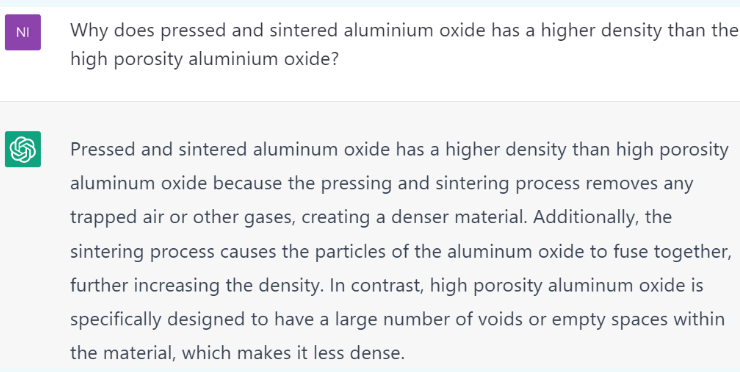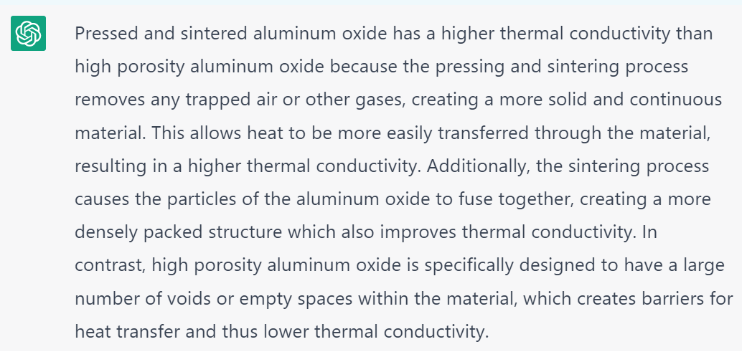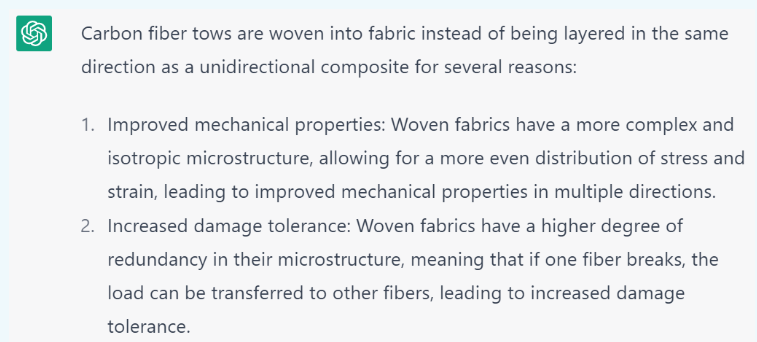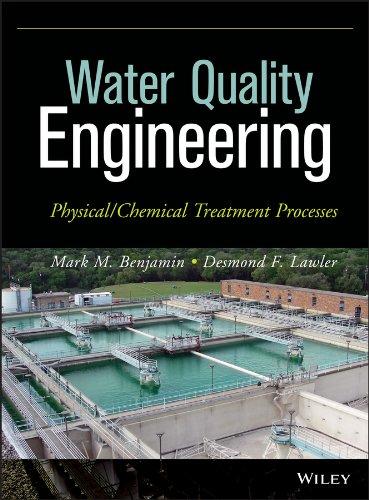Question
On your materials reference sheet there are two types of aluminium oxide listed. The pressed and sintered aluminium oxide has a higher density than the
On your materials reference sheet there are two types of aluminium oxide listed. The pressed and sintered aluminium oxide has a higher density than the high porosity aluminium oxide.
(a) I asked the artificial intelligence app why the pressed and sintered aluminium oxide had a higher elastic modulus.

Is this answer correct? Explain your answer. For full marks you will need to refer to the lecture notes, did the AI app explain all of the things that govern stiffness in ceramics? (150 words maximum. Approx 3 sentences)
4 marks
(b) I asked the AI app why the pressed and sintered aluminium oxide has a higher thermal conductivity.

Is this answer correct? For full marks you will need to refer to the lecture notes and make comment on the mechanisms of thermal conductivity in solids. Did the AI app cover all of them?
(150 words maximum. Approx 3 sentences)
4 marks
Answer text
Question 52
Not yet answered
Marked out of 4.00
Remove flag
Question text
Applied knowledge - Composites
In the Week 7 tutorial we looked at examples of carbon fibre composites. We noticed that the carbon fibre tows were woven into a fabric before impregnation with epoxy resin. The tows were aligned at 90 to one another. I asked the AI app why carbon fibre tows are woven into fabric instead of being layered in the same direction as a unidirectional composite.

In terms of mechanical properties, not cost or customer appeal, do you consider this answer to be correct? Explain your answer. For full marks refer to the at-home reading and lecture notes. (150 words maximum, approx 3 sentences)
4 marks
Answer text
Question 53
Not yet answered
Marked out of 4.00
Remove flag
Question text
Applied knowledge - Electrical properties
Explain in your own words the fundamental equation for the conductivity of solids:
=ne
How does this equation explain decreased electrical conductivity in alloys at higher temperatures and solute concentrations? For full marks you will need to mention carrier mobility and carrier concentration.
(150 words maximum, approximately 3 sentences)
4 marks
Answer text
Why does pressed and sintered aluminium oxide has a higher density than the high porosity aluminium oxide? Pressed and sintered aluminum oxide has a higher density than high porosity aluminum oxide because the pressing and sintering process removes any trapped air or other gases, creating a denser material. Additionally, the sintering process causes the particles of the aluminum oxide to fuse together, further increasing the density. In contrast, high porosity aluminum oxide is specifically designed to have a large number of voids or empty spaces within the material, which makes it less dense. Pressed and sintered aluminum oxide has a higher thermal conductivity than high porosity aluminum oxide because the pressing and sintering process removes any trapped air or other gases, creating a more solid and continuous material. This allows heat to be more easily transferred through the material, resulting in a higher thermal conductivity. Additionally, the sintering process causes the particles of the aluminum oxide to fuse together, creating a more densely packed structure which also improves thermal conductivity. In contrast, high porosity aluminum oxide is specifically designed to have a large number of voids or empty spaces within the material, which creates barriers for heat transfer and thus lower thermal conductivity. Carbon fiber tows are woven into fabric instead of being layered in the same direction as a unidirectional composite for several reasons: 1. Improved mechanical properties: Woven fabrics have a more complex and isotropic microstructure, allowing for a more even distribution of stress and strain, leading to improved mechanical properties in multiple directions. 2. Increased damage tolerance: Woven fabrics have a higher degree of redundancy in their microstructure, meaning that if one fiber breaks, the load can be transferred to other fibers, leading to increased damage toleranceStep by Step Solution
There are 3 Steps involved in it
Step: 1

Get Instant Access to Expert-Tailored Solutions
See step-by-step solutions with expert insights and AI powered tools for academic success
Step: 2

Step: 3

Ace Your Homework with AI
Get the answers you need in no time with our AI-driven, step-by-step assistance
Get Started


